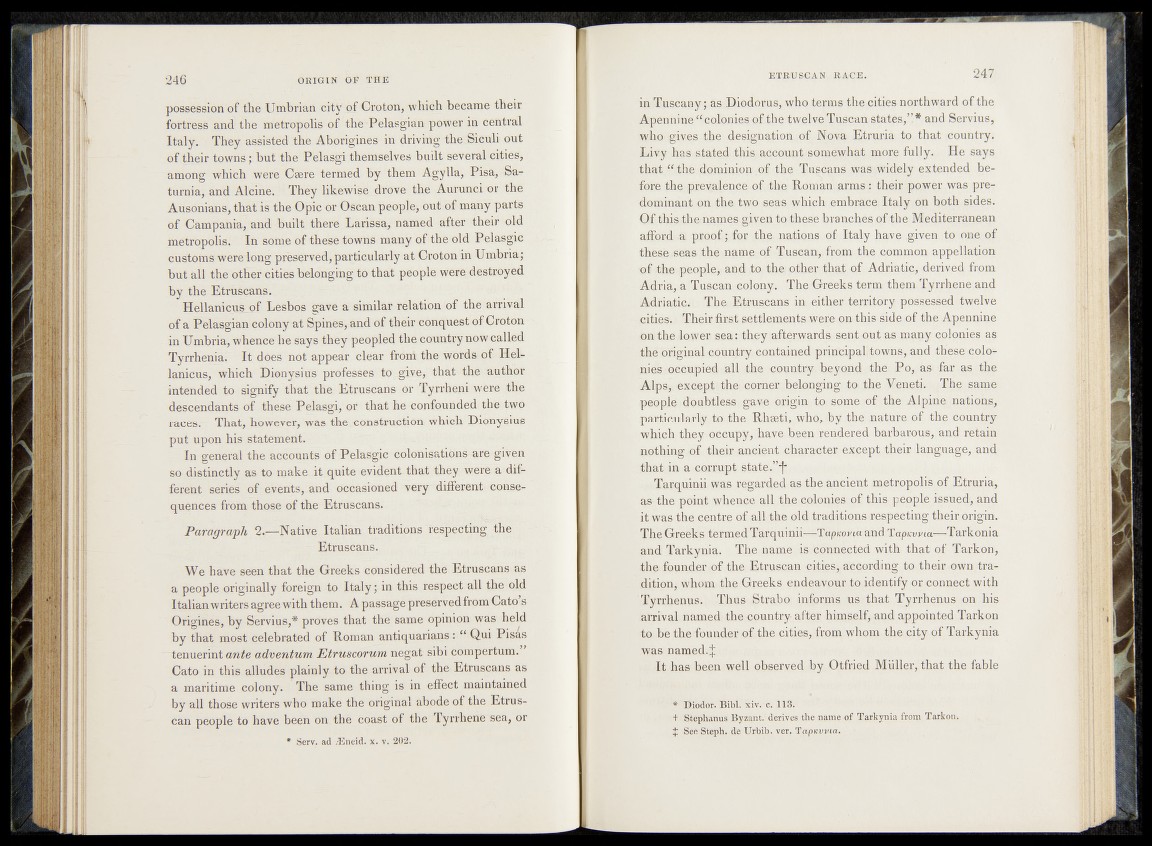
possession of the Umbrian city-of Croton, which became their
fortress and the metropolis óf the Pelasgian power in central
Italy; They assistëdCthe Aborigines-in driving the.Sicnli out
of their towns ; but the Pelasgi themselves built several cities,
among which were 'Gsere termed by them Agylla, Pisa,’§ar
turnia, and Ateiiie.: They KkeWiserlibYe the Auruncior 'thé
Ausdnians, th a tis the Opic or Oscan people» outmf many parts
of Campania, and built there Larissa, named after their old
metropolis« In some of these towns many of the old P elasgié
customs wérd long preserved, particularly a t Croton in U mbria;
but all the other cities belonging to that people were destroyed
by the Etruscans.
Hp.llanicjif of Lesbos gave a similar relation of the arrival
of a Pelasgian colony a t Spines* and of their conquest of Croton -
in Umbria> whence he says they peopled the country now called
Tyrrhenia, It dóes not appear clear froid the words"of Hei-
lafiicus, which Dionysius professes tp jp v e , that'-th# author
intended to signify that the Etruscans or Ty.rrheni were the
descendants of these Pçlasgi, or that he confounded the two
races.* That, however, was the. construction which Dionysius
put upon his statement.
In general the accounts of Pelasgimcoloniswti&jas armgivèn
so distinctly as to m à k e it quite evident-that 'they 'were a different
series of eyènts,.and occasioned v e ry different eonse«-
quénces from those of the Etruscans.
Paragraph Native Italian traditions respecting the
Etruscans.
We have seen that the Greeks considered the Etruscans as
a people originally foreign to Italy; in this respect all the old
Italian writers agrée with them. A passage preserved from Cato s
Origines, by Servius,* proves that the same opinion was held
by that most celebrated of Roman antiquarians : “ Qui Pisas
■ tenuerint ante adventum Etruscorum negat- sihi compertum.
Cato in this alludes plainly, to the arrival of the Etruscans as
a maritime colony. The same thing is in effect maintained
by all those writers who make the original abode of the Etruscan
people to have been on the coast of the Tyrrhene sea, or
* Serv. ad Æneid. x. v. 2 0 2 .
in Tuscany-; as Diodorus, who terms the cities northward of the
Apennine^eo%jdeSjqf4Jle twelveTuscap states,” * and Servius,
who gives- the designation of I^ovg. Etruria to that «country.
Lify. hags-gtate/i*;thi^pj|g§§^.t(somewh.at more fuljy. He says
that “ thé doih-ipiop^o^ the-Tuscans was-.widely extended before
the? p r e of tkepRoman, arms: their power was pre?
dominant on theit?^^é^#^hich..embj3é|ceiitaly on both ,si<|ff.
Of this the:n;ajpqS'lgiY:en to these brawfi^es of the Mediterranean
afford .a; proof; for the nations«,.c^Iialy have agaven, to one of
these,seas the-nam^of 'Tuscan,«from the, common appellation
o f the-people,, an,d .to, th e P.ther thafpfj A d ria j^ derived from
AdriS/alTuscanpaplony. The Greeks,5ts^m^thepi-Tyrrhencand
Adriatic»!) The^Etrpscans in, either territory• pqs|p,s§£d<twelve
•mtiésU "Their fas|h^ttlementswtfé«;fnthjs si de,of t|i^L Apen nine
on the .iowerjisear they'afterwards septo.ut as many colonies as
thé Original cohnfry contained prinéjpaljiowns, and tbepe^olo-
mids ».occupied élLthq country beyond .the Po,ras Tar as the
A$p% excepty|/he? corner..belonging to .the .-f[eneti. Tfip same
«people doaktfe^s^gayc^êfig-in some|of lthe! Alpine «nations,
particularly.; to* the Rl^geti, who, by .the ^nature of the country
which they?;^èépy, havQabpen‘re n j^ § d barbarous,, and retain
nothing of their ancient character éxpept their language, and
that in a corrupt §tate.v’i*
Tarquinmw&s regarded as the ancient metropolis of Etruria,
as- the point whence all the.oplonies.pf this people issued^ and
1 it was the centre of. all the old.traditions respecting their origin.
The Greeks termed Tarquinii—TapKoytwanad.Tapicwvta-—T®Êkwia
and Tarkynia. The name is connected with that of Tarkon,
.the founder ,of the Etruscan cities, according to their own tradition,
whom'the Greeks endeavpur.to identify or connect with
'Tyrrhenes. Thus siptrabp?. informs, us that Tyrrhehus on his
arrival named the country* after himself, apd appointed Tarkon
•to be the founder of the pities, from whom the city of Tarkynia
was named.:$j |
It has been well observed by Otfried Miiller, that the fable
* TÖiodor. Bibl. xiv.'fe. 113.
4 itepfonus By*ane?dc!ive8;#MS name of Tarkynia froip Tarkon.
$ SeeSteph. de Urbib.ver, Taptevvia.